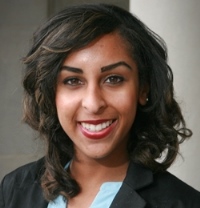
“Three Questions” is a series that explores the work of members of the School of Education’s faculty and its students.
Simone Diggs, a student in the School Counseling master’s degree program, recently won a runner-up award in the American Counseling Association’s Student Ethics essay competition, a competition that was open to master’s and doctoral-level students from across the country.
Diggs is from South Carolina and earned a bachelor’s degree in psychology from the University of South Carolina in 2013. Before coming to Chapel Hill, she worked as an Applied Behavior Analysis therapist for the Early Autism Project, which offers treatment for children and young adults with autism spectrum and related disorders. She has worked as a mental health specialist for Children’s Place, Inc., an Aiken, S.C., agency that provides services and support for children with significant developmental and behavioral problems.
Diggs’ essay – entitled “The School Counselor’s Armor” – was entered into the ACA’s Roland and Dorothy Ross Trust Graduate Student Essay Competition for Future School Counselors.
In the essay, Diggs describes ethics as a “shield” or personal armor that helps protect professionals when they encounter dilemmas in their work. She advocates for “ethics teams” of counselors and support personnel to be established at school and district levels. The teams would meet occasionally to discuss relevant issues and serve as accountability partners to other team members.
1. Explain what you mean when you describe ethics as a “shield” for school counselors?
During battle, protecting oneself with a shield is integral to the success of the entire group. If each warrior is equipped with a shield, they are more likely to survive. As school counselors, we often experience a “battlefield” of our own: the school environment. Our role requires us to consult with many individuals when we make decisions.
If we fail to consider ethical standards, we subject ourselves to attacks from clients, parents, teachers, administrators, and in some cases the law. We are responsible for protecting ourselves. Moreover, we are responsible for protecting our clients to the best of our ability.
Ethical standards are the survival tool that helps us accomplish both of these responsibilities.
2. Tell about what your experience working with children with developmental disorders informs your preparation as a counselor.
Doing therapy with autistic children taught me a lot about both the population I was working with and myself. It takes a great deal of patience to work with these children, but the intrinsic reward is indescribable. Working as an ABA therapist prepared me for the patience and perseverance I need to be an effective school counselor. It also increased my desire to advocate for students with special needs.
I have generalized some of the techniques I learned to working with the self-contained students at my internship site.
3. Why Carolina? Why UNC’s School of Education? Why did you choose to come here?
UNC was at the top of my list for graduate programs. Carolina is the full package. It is a prestigious institution with a gorgeous campus.
The faculty were especially influential in my decision to come here. After reading about their accomplishments, I had no doubt that I wanted to be trained by some of the best in the field. They truly believe in our strengths and encourage us to never be complacent. That is a huge part of why this program is successful!